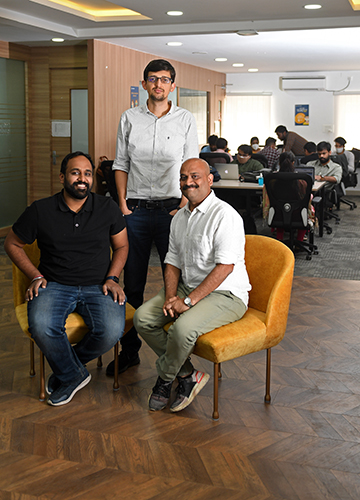It was “trust issues”that made three young entrepreneurs—Himesh Joshi, Arjit Gupta, and Karan Gupta—think about building a new tech-powered health care model for India. And by the time they unveiled their model via their startup Ayu Health, the pandemic hit the country and made it apparent how unreliable the country’s existing health care system is for a large section of the population.
“During our research, we found that there were only a few trusted hospital brands in the country,”says Joshi, CEO, Ayu Health. “But these top brands are often out of reach for most patients. For an average person, differentiating between hospitals is often a challenge. Earlier, we used to have a system of the family doctor. People had trust in him, and he would suggest which hospital they should go to. We do not have this system anymore, and patients do not know which hospital is good and which is not.”
This made the tech-trio think about offering clear information to the public on the number of available beds, doctors, surgeons and medicines in each of the hospitals near their location. They observed that by providing adequate information, people will have more trust in the hospital facilities—and also would help them take timely decisions.
Thus, the tech-trio decided to build a branded private hospital chain that an average Indian can trust and afford for its transparency and quality. “We thought this trust must be built on three broad pillars—consistently good clinical outcomes, transparent and affordable pricing, and quality experience,”says Joshi. “Our mission is to make quality health care accessible to everyone, everywhere.”
Ayu Health started operations in 2019 making a Chandigarh hospital its partner. The hospital started using the technology platform built by the startup for patient management. Ayu Health digitised the entire consultation, medicine prescription and payments procedure to offer a better experience to customers. It also helped its partner hospital to create a more “asset-light”network, where Ayu Health manages end-to-end administrative operations and the medical faculty concentrate on clinical outcomes. This partnership model soon attracted many other small and medium-sized hospitals. Now, this unique model has 40-plus hospitals in Bengaluru and 20-plus hospitals in Chandigarh as part of its chain.
Joshi says that there are plenty of multispeciality and super-speciality hospitals in India with good health care outcomes, but are not doing very well on the business front. “We found that these hospitals are lagging in terms of managing the procurement of drugs and consumables, insurance and continuously evaluating technology to improve patient experience,” he says. “So, we co-branded these hospitals, gave an operating system to run the hospital, [and deployed] technology to improve patient conversion and patient experience. We also helped them procure drugs and other equipment at better prices, and have better insurance partnerships.”
Before diving into the health care sector, Joshi, Arjit and Karan were into e-commerce. Their refurbished goods marketplace, Zefo, was acquired by online classifieds platform Quikr in 2019 for 0200 crore in an all-stock deal. Karan comes from a family of doctors. And that connection was crucial in the trio’s shift to health tech.
“Karan’s father had set up this 100-bed super speciality hospital—something into which he had invested a lot of money and effort,”says Joshi. “He had been running it for the last three to four years, but the hospital was not doing that well [on the business side]. [After Zefo was acquired], Karan’s plan was to go and help his father [with the business]. And, that is where his—and later our—research about the problems faced by unbranded hospitals started.”
The trio launched the startup after five months of research. Joshi says that the pandemic has been a hindrance to their growth. “We would have probably grown more in the last two years [if there was no pandemic],”says Joshi. “But one silver lining of the whole pandemic was that it accelerated the adoption of technology in the Indian health sector. And, we were always available for our partners [to provide solutions demanded by the Covid phase]. For instance, we launched a telemedicine application for our partners within 24 hours after the government released the new telemedicine guidelines.”
He is hopeful that the digitisation push will make the patients more informed and demanding about the quality of medical care they receive. And he is confident about Ayu Health’s unique health care model.
In September 2021, the company raised $6.3 million in funding for expanding its hospital network and building new technology solutions for hospital management. The startup expects to grow its business ten-fold in the financial year 2022. It also aims at 5,000 additional beds in six cities by December.


